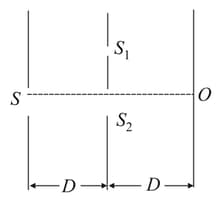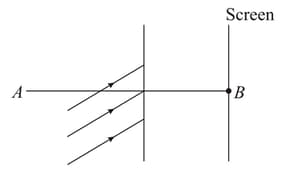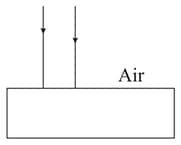D. C. Pandey Solutions for Chapter: Interference and Diffraction of Light, Exercise 17: Objective Problems [Level 2]
D. C. Pandey Physics Solutions for Exercise - D. C. Pandey Solutions for Chapter: Interference and Diffraction of Light, Exercise 17: Objective Problems [Level 2]
Attempt the free practice questions on Chapter 8: Interference and Diffraction of Light, Exercise 17: Objective Problems [Level 2] with hints and solutions to strengthen your understanding. Complete Study Pack for Engineering Entrances Objective Physics Vol 2 solutions are prepared by Experienced Embibe Experts.
Questions from D. C. Pandey Solutions for Chapter: Interference and Diffraction of Light, Exercise 17: Objective Problems [Level 2] with Hints & Solutions
Two ideal slits and are at a distance apart and illuminated by light of wavelength passing through an ideal source slit placed on the line through as shown. The distance between the planes of slits and the source slit is .

A screen is held at a distance from the plane of the slits. The minimum value of for which there is darkness at is
Light of wavelength is incident normally on two slits of separation width . The angular width of the central diffraction maximum at a distance of from the slits is
A beam of light parallel to central line is incident on the plane of slits. The number of minima obtained on the large screen is . Now, if the beam is tilted by some angle as shown in the figure, then the number of minima obtained is . Then

The intensity of each of the two slits in Young's double slit experiment is . Calculate the minimum separation between the two points on the screen, where intensities are and . Given, the fringe width equal to .
The Young's double slit experiment is made in a liquid. The tenth bright fringe in liquid lies in screen whereas sixth dark fringe lies in vacuum. The refractive index of the liquid is approximately,
A parallel beam of light of intensity is incident on a glass plate. of light is reflected in any reflection by upper surface and of light is reflected by any reflection from lower surface. Rest is refracted. The ratio of maximum to minimum intensity in the interference region of reflected rays is

Assertion: In Young's double-slit experiment, often both the phenomena interference and diffraction are present.
Reason: Diffraction results due to the superposition of wavelets from different points of some wavefront.
Assertion: In the diffraction phenomenon, different maxima have different intensities.
Reason: In interference, different maxima have the same intensities.
